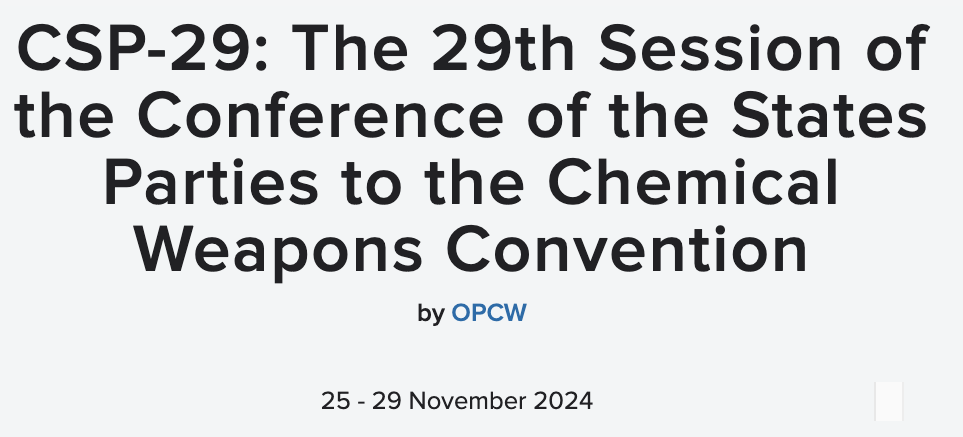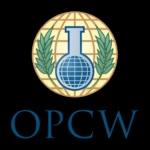NGO Statement: Improving Interactions between Civil Society and the OPCW
Mr. Chairman, Director-General, Distinguished Delegates, Civil Society Colleagues:
The OPCW has been pivotal in pursuing a world free of chemical weapons. As the OPCW adapts to new-age crises and emerging challenges, enhancing collaboration with civil society organizations (CSOs) becomes indispensable in safeguarding the objectives of the Chemical Weapons Convention (CWC). Myriad civil society organizations under CWC Coalition bring diverse expertise across fields such as Arms control and disarmament, public health, human rights, environmental safety, and regional security. To fully realize the CWC's vision, the OPCW must continue and deepen engagement with CSOs, fostering a multi-dimensional, inclusive, and equitable partnership.

Mr Chairman,
Historically, civil society engagement with the OPCW has primarily been restricted to the Conference of the States Parties (CSP). However, attendance at CSP sessions is often financially challenging for many NGOs, resulting in a significant representation imbalance. Expanding intersessional engagement opportunities, such as thematic forums and workshops, would allow NGOs from underrepresented regions to contribute substantively. These intersessional forums could focus on critical areas like verification, chemical safety, victim assistance, and capacity building, providing a platform for civil society to offer specialized knowledge and contribute to policy planning.
It is essential to reform the accreditation process to foster transparency, which is currently vulnerable to political influence. The current structure excludes several CSOs, particularly those addressing politically sensitive topics. Establishing a more transparent, equitable, and criteria-based accreditation system tailored to the OPCW's specific needs would ensure a fair
representation of voices and minimize arbitrary exclusions.
Mr. Chairman,
Building on existing relationships and over a decade-long experience of the OPCW could formalize long-term partnerships with NGOs working on disarmament, human rights, and environmental issues, specific CWC-relevant themes, such as toxic chemical disposal, public health, or victims' rights. Successful examples underscore the potential for effective collaboration
and partnerships supporting policy development and implementation. Such institutional partnerships would enable ongoing dialogue, resource sharing, and project-based collaborations with CSOs that align with the OPCW's strategic priorities.
A comprehensive mapping of civil society actors engaging with the OPCW, detailing their thematic focuses and regional backgrounds, would aid in identifying underutilized expertise. By gathering and organizing data on CSO contributions, the OPCW can create targeted engagement strategies, ensuring civil society input aligns with implementation priorities, especially in regions requiring capacity-building support.
Mr. Chairman,
To increase its effectiveness in supporting the OPCW in achieving the Convention's (CWC) objectives, the Chemical Weapons Convention Coalition (CWCC) would be working on its existing strengths and addressing evolving challenges. A few recommendations are in order:
● A more globally representative civil society is critical to supporting the OPCW's broader mandate, particularly as it shifts focus towards prevention and non-proliferation. Efforts to involve CSOs from underrepresented regions would help the universalization of the CWC and encourage a more robust global commitment to chemical weapon disarmament.
● Both OPCW and the Coalition can address the underrepresentation of certain regions, such as Latin America, Africa, and Southeast Asia, by establishing regional CWCC chapters or networks to connect and mobilize local NGOs on chemical weapons issues, making their voices heard at international forums.
● The Coalition and OPCW can encourage enhanced communication and public awareness to sustain global attention and support for chemical disarmament, primarily through digital social media campaigns. This will also facilitate year-round digital engagement between OPCW and civil society organizations beyond the annual Conference of States Parties.
● Voluntary funding to the Trust Fund for Civil Society could be employed to enhance the participation of civil society organisations that cannot attend the CSP due to financial reasons. Moreover, the Trust Fund could be utilized for intersessional activities with civil society partners.
Civil Society Organizations represent diverse stakeholders with the common goal of achieving a world free of chemical weapons. We believe these recommendations can bring together these stakeholders, improve OPCW’s engagement with civil society organizations, and further advance the objectives of the Chemical Weapons Convention.
We request that this statement be included in the record of the 29th Conference of States Parties to the Chemical Weapons Convention.
The Joint Statement Can be read here on the OPCW Website.
